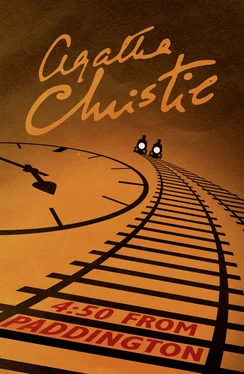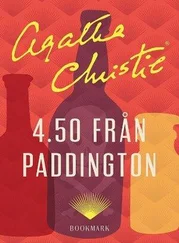‘What’s on your mind, Jane?’
‘I suggest, Elspeth, that I should travel up to London with you, and that we should travel down again as far as Brackhampton in the train you travelled by the other day. You would then return to London from Brackhampton and I would come on here as you did. I , of course, would pay the fares ,’ Miss Marple stressed this point firmly.
Mrs McGillicuddy ignored the financial aspect.
‘What on earth do you expect, Jane?’ she asked. ‘Another murder?’
‘Certainly not,’ said Miss Marple, shocked. ‘But I confess I should like to see for myself, under your guidance, the—the—really it is most difficult to find the correct term—the terrain of the crime.’
So accordingly on the following day Miss Marple and Mrs McGillicuddy found themselves in two opposite corners of a first-class carriage speeding out of London by the 4.50 from Paddington. Paddington had been even more crowded than on the preceding Friday—as there were now only two days to go before Christmas, but the 4.50 was comparatively peaceful—at any rate, in the rear portion.
On this occasion no train drew level with them, or they with another train. At intervals trains flashed past them towards London. On two occasions trains flashed past them the other way going at high speed. At intervals Mrs McGillicuddy consulted her watch doubtfully.
‘It’s hard to tell just when—we’d passed through a station I know …’ But they were continually passing through stations.
‘We’re due in Brackhampton in five minutes,’ said Miss Marple.
A ticket collector appeared in the doorway. Miss Marple raised her eyes interrogatively. Mrs McGillicuddy shook her head. It was not the same ticket collector. He clipped their tickets, and passed on staggering just a little as the train swung round a long curve. It slackened speed as it did so.
‘I expect we’re coming into Brackhampton,’ said Mrs McGillicuddy.
‘We’re getting into the outskirts, I think,’ said Miss Marple.
There were lights flashing past outside, buildings, an occasional glimpse of streets and trams. Their speed slackened further. They began crossing points.
‘We’ll be there in a minute,’ said Mrs McGillicuddy, ‘and I can’t really see this journey has been any good at all . Has it suggested anything to you, Jane?’
‘I’m afraid not,’ said Miss Marple in a rather doubtful voice.
‘A sad waste of good money,’ said Mrs McGillicuddy, but with less disapproval than she would have used had she been paying for herself. Miss Marple had been quite adamant on that point.
‘All the same,’ said Miss Marple, ‘one likes to see with one’s own eyes where a thing happened. This train’s just a few minutes late. Was yours on time on Friday?’
‘I think so. I didn’t really notice.’
The train drew slowly into the busy length of Brackhampton station. The loudspeaker announced hoarsely, doors opened and shut, people got in and out, milled up and down the platform. It was a busy crowded scene.
Easy, thought Miss Marple, for a murderer to merge into that crowd, to leave the station in the midst of that pressing mass of people, or even to select another carriage and go on in the train wherever its ultimate destination might be. Easy to be one male passenger amongst many. But not so easy to make a body vanish into thin air. That body must be somewhere .
Mrs McGillicuddy had descended. She spoke now from the platform, through the open window.
‘Now take care of yourself, Jane,’ she said. ‘Don’t catch a chill. It’s a nasty treacherous time of year, and you’re not so young as you were.’
‘I know,’ said Miss Marple.
‘And don’t let’s worry ourselves any more over all this. We’ve done what we could.’
Miss Marple nodded, and said:
‘Don’t stand about in the cold, Elspeth. Or you’ll be the one to catch a chill. Go and get yourself a good hot cup of tea in the Restaurant Room. You’ve got time, twelve minutes before your train back to town.’
‘I think perhaps I will. Good-bye, Jane.’
‘Good-bye, Elspeth. A happy Christmas to you. I hope you find Margaret well. Enjoy yourself in Ceylon, and give my love to dear Roderick—if he remembers me at all, which I doubt.’
‘Of course he remembers you—very well. You helped him in some way when he was at school—something to do with money that was disappearing from a locker—he’s never forgotten it.’
‘Oh, that !’ said Miss Marple.
Mrs McGillicuddy turned away, a whistle blew, the train began to move. Miss Marple watched the sturdy thickset body of her friend recede. Elspeth could go to Ceylon with a clear conscience—she had done her duty and was freed from further obligation.
Miss Marple did not lean back as the train gathered speed. Instead she sat upright and devoted herself seriously to thought. Though in speech Miss Marple was woolly and diffuse, in mind she was clear and sharp. She had a problem to solve, the problem of her own future conduct; and, perhaps strangely, it presented itself to her as it had to Mrs McGillicuddy, as a question of duty.
Mrs McGillicuddy had said that they had both done all that they could do. It was true of Mrs McGillicuddy but about herself Miss Marple did not feel so sure.
It was a question, sometimes, of using one’s special gifts … But perhaps that was conceited … After all, what could she do? Her friend’s words came back to her, ‘You’re not so young as you were …’
Dispassionately, like a general planning a campaign, or an accountant assessing a business, Miss Marple weighed up and set down in her mind the facts for and against further enterprise. On the credit side were the following:
1. My long experience of life and human nature.
2. Sir Henry Clithering and his godson (now at Scotland Yard, I believe), who was so very nice in the Little Paddocks case.
3. My nephew Raymond’s second boy, David, who is, I am almost sure, in British Railways.
4. Griselda’s boy Leonard who is so very knowledgeable about maps.
Miss Marple reviewed these assets and approved them. They were all very necessary, to reinforce the weaknesses on the debit side—in particular her own bodily weakness.
‘It is not,’ thought Miss Marple, ‘as though I could go here, there and everywhere, making inquiries and finding out things.’
Yes, that was the chief objection, her own age and weakness. Although, for her age, her health was good, yet she was old. And if Dr Haydock had strictly forbidden her to do practical gardening he would hardly approve of her starting out to track down a murderer. For that, in effect, was what she was planning to do—and it was there that her loophole lay. For if heretofore murder had, so to speak, been forced upon her, in this case it would be that she herself set out deliberately to seek it. And she was not sure that she wanted to do so … She was old—old and tired. She felt at this moment, at the end of a tiring day, a great reluctance to enter upon any project at all. She wanted nothing at all but to march home and sit by the fire with a nice tray of supper, and go to bed, and potter about the next day just snipping off a few things in the garden, tidying up in a very mild way, without stooping, without exerting herself …
‘I’m too old for any more adventures,’ said Miss Marple to herself, watching absently out of the window the curving line of an embankment …
A curve …
Very faintly something stirred in her mind … Just after the ticket collector had clipped their tickets …
It suggested an idea. Only an idea. An entirely different idea …
A little pink flush came into Miss Marple’s face. Suddenly she did not feel tired at all!
Читать дальше












